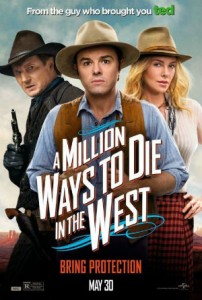A Million Ways to Die in the West
Posted on May 29, 2014 at 5:58 pm
 When Seth MacFarlane tops his unprecedented success on television with three animated series (“Family Guy,” “The Cleveland Show,” “American Dad”) and his first feature film was a blockbuster — the talking teddy bear movie Ted is the highest grossing R comedy of all time, in both senses of the word, with a sequel in the works. He also found time to put out an album of American songbook standards that received widespread if somewhat grudging critical acclaim (Music Is Better Than Words
When Seth MacFarlane tops his unprecedented success on television with three animated series (“Family Guy,” “The Cleveland Show,” “American Dad”) and his first feature film was a blockbuster — the talking teddy bear movie Ted is the highest grossing R comedy of all time, in both senses of the word, with a sequel in the works. He also found time to put out an album of American songbook standards that received widespread if somewhat grudging critical acclaim (Music Is Better Than Words) and produce a popular reboot of Carl Sagan’s “Cosmos” series. His only real flop to day was his disappointing hosting job at the Oscars (the song “We Saw Your Boobs” and sexist jokes did not go over well). So, he can write his own ticket in Hollywood. And that is what he has done with “A Million Ways to Die in the West,” a silly comedy that reflects the excessive deference given to someone with that track record. You want to do a western? Fine! You want to not just write and direct but also cast yourself as the lead opposite top-ranked actors? With lots of fart jokes? Where do we sign?
And that is how “A Million Ways to Die in the West” got made. It is too long, too dumb, and too gross. But sometimes funny.
The saucer-eyed MacFarlane plays Albert, a sheep farmer who hates living in the west where “everything that is not you is trying to kill you.” A motif of the film is the many ways minor characters are killed off, intentionally or by accident. We meet Albert talking his way out of a shootout on the main street, to the disappointment of the assembled townsfolk and his fiance, Louise (Amanda Seyfried, the local schoolmarm). Louise dumps him, and Albert is devastated. His friends Edward (Giovanni Ribisi) and his fiancee Ruth (Sarah Silverman) try to comfort him, but he is inconsolable until he meets Anna (Charlize Theron), new in town. She offers to help him make Louise jealous, but they find themselves attracted to one another. Unfortunately (as we know early on but Albert does not), Anna is married to the West’s most notorious gunslinger, with the macho name of Clinch Leatherwood (Liam Neeson).
The movie looks and sounds like a classic western, with sun-burnished views of Monument Valley from Director of Photography Michael Barrett and an evocative score by Joel McNeely, both MacFarlane regulars. Neeson is outstanding, as always, never winking at the camera. Neil Patrick Harris is a pleasure as Albert’s romantic rival, a mustachioed slicker who can dance up a storm. Theron manages the more challenging trick of making Anna feel real, even though she is delivering contemporary dialog in buckskin and a bustle. It is a wonderfully natural, appealing performance that does wonders to give MacFarlane more humanity and make him seem a little less whiny and juvenile.
Unfortunately, the move keeps things pretty whiny and juvenile anyway, with MacFarlane taking full advantage of the MPAA’s notoriously lax standards for a studio comedy to include material that is more tiresome than outrageous. More unfortunately, it goes on at least 40 minutes too long, with an extended drug trip hallucination sequence that feels as endless as your college roommate’s moment by moment rendition of his dream. Lame humor includes an extended conversation about people in olden days not smiling in photographs and Ruth’s activities as a prostitute who as a good Christian won’t sleep with her boyfriend until they are married. There are no set-pieces as funny as Mark Wahlberg’s recitation of trashy girl names in “Ted” and the guest stars feel stunt-ish, not a part of the storyline as Sam Jones and Norah Jones were in that film. By the time the sheep is peeing on Albert’s face, the audience may feel that in the old west as ever, dying is easy but comedy is hard.
Translation: Constant extremely crude and gross-out humor with very explicit and raunchy sexual references and situations and extensive bodily function humor, nudity, jokes about prostitution and child molestation, racial and sexual orientation humor, western-style violence with shoot-outs and many characters injured and killed, disturbing images, drinking, smoking, drug use, very strong and explicit language including the r-word
Family discussion: What do the “straight” western elements of this film like the cinematography, landscapes, and score contribute to its overall effect? Do you think any of these jokes went too far?
If you like this, try: “Ted” and “Blazing Saddles”

One Reply to “A Million Ways to Die in the West”
Comments are closed.